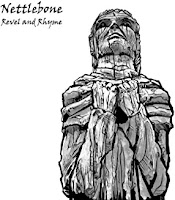- Nettlebone, 100 mile house and Douglas MacGregor reviewed
Distracted by
world events and global pandemics we could be forgiven for being too
preoccupied over the past couple of two years to notice some fascinating albums
that were quietly released into a world gone mad or, as one of the artists
reviewed here put it, a world turned upside down. So, as a public service, here’s
a little recap of what you might have missed...
Nettlebone’s Revel and Rhyme
Revel and Rhyme is a serious-minded collection of original ballads in the English folk song tradition. The opening track 'World Turned Upside Down' makes it clear these are songs of dissent, calling for 'No kings, no queens, no lords above, no walls to come between us'. The sentiment of the lyrics remains uncannily topical in these times of post-Brexit Britain and a divided America, struggling to recover from Trump’s presidency.
The album is the handiwork of brothers
Dominic and Justin Forrest. Dominic provides a bedrock of Irish bouzouki, mandolin and guitar and the
sound is greatly enriched by the addition of Jon Loomes' hurdy-gurdy, fiddle
and viola and Jude Rees' distinctive flourishes of oboe, shawm, crumhorn, recorder
and flute (which provide a pleasing early music feel.)
The Forrest brothers know their anti-establishment
history: 'A Revel' celebrates Wat Tyler (leader of the Peasants' Revolt of 1381)
and the radical priest John Ball; 'Anna Pink' concerns a renowned 18th-century
merchant vessel while 'Towton' commemorates a decisive battle in the Wars of
the Roses. It's all stirring stuff, but, while inequality and injustice persist,
I think Nettlebone could allow themselves to sound even more outraged.
100 mile house’s Love and Leave You (on Fallen Tree Records)
As the title suggests 100 mile house's second album is all about relationships and loss. Love and Leave You is unflinching in its acknowledgment of life's inevitable sadnesses. The eleven songs cover themes including depression, parental alcoholism, difficulties starting a family, the breakdown of sibling relationships, the loss of a child and caring for a partner with dementia.
If all of this sounds rather too
melancholic the album is also a celebration of human warmth and resilience. As
the lyrics of 'Grateful' observe: 'If it wasn't for our darkness we wouldn't
know what we're made of.' The moral of 'Like Each Day' - a
beautifully-crafted family saga - is that, whatever life throws at us, we
should live each day as if it's our last.
This oddly-named Anglo-Canadian duo (named after a town in British Columbia) are
husband and wife Peter Stone and Denise MacKay. Stone's vocal delivery, always
understated, is reminiscent of John Gorka and Leonard Cohen. With sympathetic, delicate
touches of mandolin and violin, the songs' narratives are all the more
emotionally powerful for their matter-of-fact restraint and uncluttered
arrangements.
Douglas MacGregor’s Songs of Loss and Healing
Finally, Songs of Loss and Healing. This is the third solo album by accomplished London-based classical guitarist Douglas MacGregor. A deeply personal project, it explores the connections between music, loss and healing - MacGregor experienced delayed grief, twenty-five years after the death of his mother to cancer when he was only seven.
The album is emotionally challenging - a
musical journey through grief - so it's unsurprising that there are few strong
melodic themes to hook us in; instead there are scattered, searching motifs and
an emphasis on creating a mood evoking the confusion and uncertainty of loss.
'The Pathway' hovers between major and minor, as if battling not to stray into
sadness. 'New Beginnings' starts tentatively, as if it dare not hope that grief
can be resolved.
One of the most appealing tracks is the
waltz 'Song for Lost Childhood', which reminded me of Freddie Phillips' music from
'Trumpton' and 'Camberwick Green' - TV delights of my own lost childhood.
Songs
of Loss and Healing is
an honest, brave project that celebrates the power of music in grief.



No comments:
Post a Comment